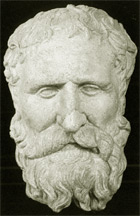The importance of being Diogenes
 Today the word “cynic” disapprovingly refers to a person who believes
that people are only interested in themselves and are not sincere. So,
some of us are deeply cynical about certain politicians because they
seem to look after their own welfare. Sometimes even advertising is
referred to as the most cynical of industries. Oscar Wilde, however,
defined a cynic as “A man who knows the price of everything and the
value of nothing.” On the other hand, the celebrated English novelist E.
M. Foster said, “Pathos, piety, courage - they exist but are identical
and so is filth. Everything exists, nothing has value.” Today the word “cynic” disapprovingly refers to a person who believes
that people are only interested in themselves and are not sincere. So,
some of us are deeply cynical about certain politicians because they
seem to look after their own welfare. Sometimes even advertising is
referred to as the most cynical of industries. Oscar Wilde, however,
defined a cynic as “A man who knows the price of everything and the
value of nothing.” On the other hand, the celebrated English novelist E.
M. Foster said, “Pathos, piety, courage - they exist but are identical
and so is filth. Everything exists, nothing has value.”
In ancient Greece, Cynicism was a philosophy based on the belief that
the very essence of civilisation is corrupt and that civilisation
destroys people by making them soft and subject to the whims of fortune.
Cynicism was founded by Antisthenes (c.455-360 BCE). The Cynics admired
Socrates but distanced themselves from Plato and Aristotle. It is said
that Antisthenes walked about five miles every day to listen to
Socrates.
After Socrates’s death, Antisthenes founded his own philosophical
school “Cynosarges” (The Silver Dog). The most famous proponent of
Cynicism was Diogenes (c.412-323 BCE) who virtually lived like a dog. He
hardly washed himself, refused to follow conventional standards of dress
and behaviour and scrounged for food. After studying under Antisthenes,
Diogenes went one step further than his guru by living with a pack of
stray dogs.
Alexander the Great
One day Alexander the Great wished to meet Diogenes who was sitting
on the beach. The king looked down from his magnificent horse and said,
“I am Alexander the Great.”
|

Diogenes: ‘A Socrates gone mad.’ |
“I am Diogenes, the dog,” Diogenes said.
“What can I do for you?” the king asked.
“Stand aside, you’re blocking my light,” said Diogenes.
Unlike some of our modern rulers, Alexander the Great did not lose
his cool. The king was so impressed by Diogenes’s character that he said
later, “If I were not Alexander, I would be Diogenes.”
Like Zen masters, the Cynics lived simple and unconventional lives.
They gave up almost everything to live happily. Luxury was anathema to
them. They believed that it produced more complications and frustration
in man. They sought supreme happiness through self-discipline, rational
control of all desires and living away from sophisticated society. In a
way, they followed some of the basic principles of Buddhism.
Cynics
Antisthenes and Diogenes were genuine Cynics who followed what they
preached. However, later Cynics became so arrogant that they hated the
very society in which they lived. Their indiscriminate contempt for
everything under the sun gave rise to the modern meaning of cynicism.
Today a cynic has a contempt for people and institutions. He is
excessively critical of society.
All right-thinking people owe a great debt to Diogenes for professing
a simplistic lifestyle sans the trappings of modern civilisation. Like
most philosophers, he upheld the mastery of self above everything else.
He dismissed metaphysics, intellectual snobbery of philosophers and
claimed that happiness could only be achieved by living according to
nature. In other words, he wanted the people to satisfy their basic
needs by the simplest means possible.
Plato who despised the ways of Diogenes called him “A Socrates gone
mad.” Although Diogenes lived as a mendicant, he is believed to have
written several books on philosophy. However, none of his writings has
survived. His philosophy has come to us through stories and sayings
found in a variety of classical sources.
Social values
Diogenes’s uncompromising philosophy that requires people to abandon
all property, possessions, family ties and social values may not be
practicable today. But he reminded, at least indirectly, that amassing
wealth and seeking fame produce only frustration in the long run.
Therefore, we cannot disagree with his philosophical way of life. We
have to pick and choose what can be applicable to our modern lifestyle.
Diogenes’s philosophy has its counterparts in the teachings of the
oriental schools of Buddhism and Taoism. Philosophers down the ages have
been trying to find answers to our problems. However, most of us are
seeking the reassurance that no such answers are possible. That is the
tragedy of human nature.
|

